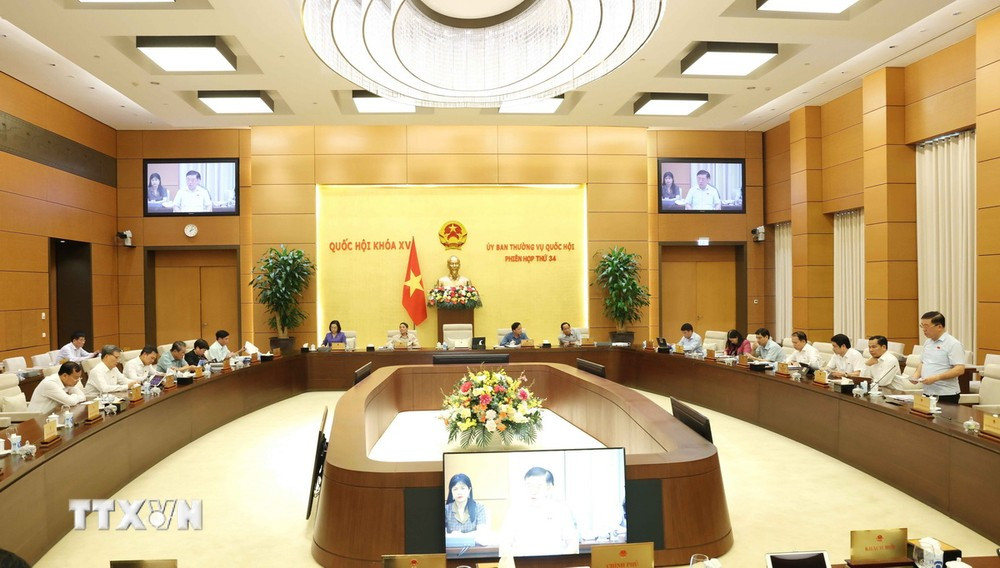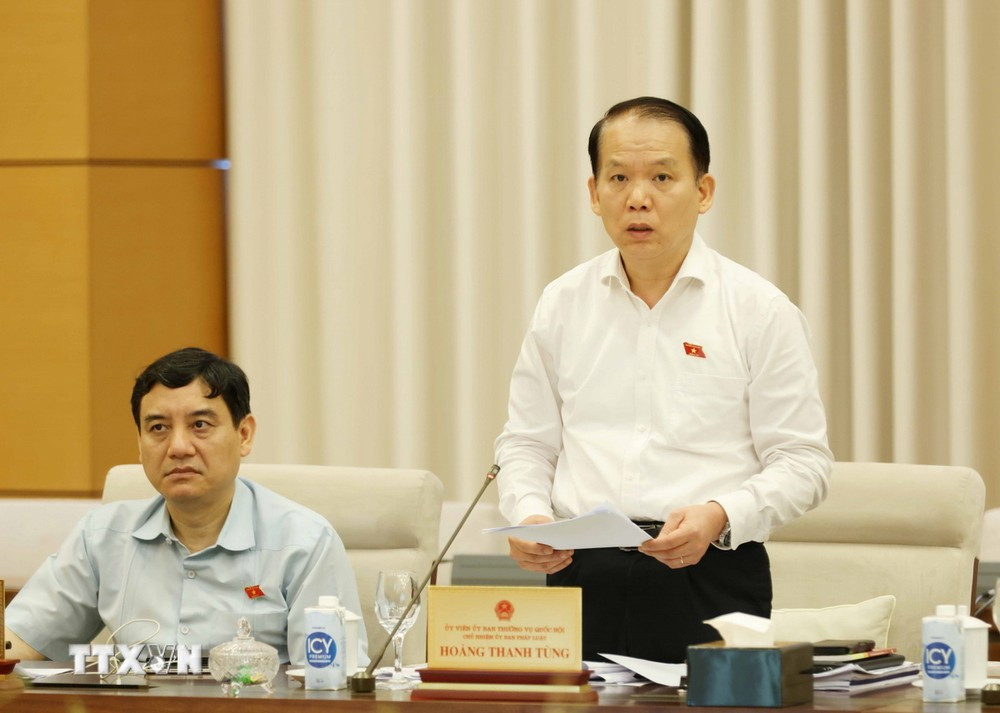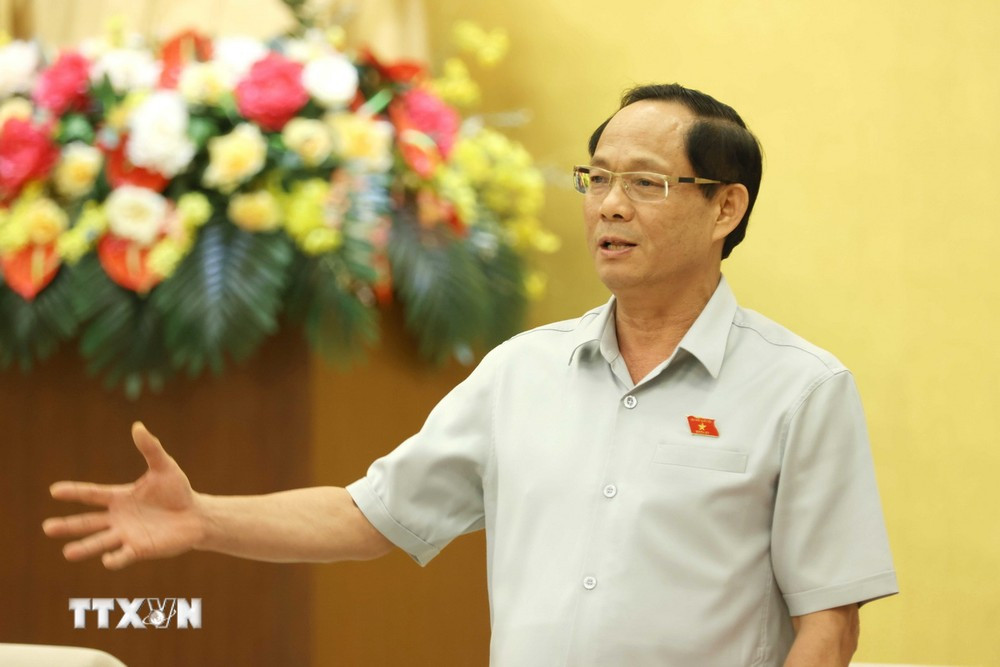The revised Law on the Capital proposes 7 cases in which Chairmen of People's Committees at all levels are allowed to cut off electricity and water, mainly for construction works and business establishments that violate construction and fire prevention and fighting regulations.

On the afternoon of June 11, continuing the 34th Session, the National Assembly Standing Committee gave opinions on explaining, accepting, and revising the draft Law on the Capital (amended).
Reporting at the meeting, Chairman of the National Assembly's Law Committee Hoang Thanh Tung said that at the 7th Session, the National Assembly gave opinions on the draft Law on the Capital (amended).
Based on the opinions of National Assembly deputies and the Government, the Standing Committee of the Law Committee has drafted a Report on explanation, acceptance, and revision of the draft Law and reviewed and revised the entire content of the draft Law, ensuring timely and complete institutionalization of the Central Government's and the Politburo's guidelines and policies on construction, development, management and protection of the Capital, especially Resolution No. 15-NQ/TW and Conclusion No. 80-KL/TW of the Politburo; at the same time, closely following the 9 groups of policies decided by the National Assembly when adding the Law project to the Law and Ordinance Development Program.
The Standing Committee of the Law Committee reported to the Standing Committee of the National Assembly 5 major contents in explaining, accepting and revising the draft Law on the Capital (amended), including: the management and use of land at river banks and floating banks on diked rivers; on the form of land allocation, land lease and the role of the Management Board in land management in the Hoa Lac High-Tech Park; on the management and use of public assets and exploitation of infrastructure works; on the controlled testing mechanism; on the implementation of build-transfer (BT) contracts.
Regarding the controlled testing mechanism, during the discussion, there were opinions suggesting to carefully consider giving the City People's Council the right to decide on exemption from the application of legal provisions; clarify the exemption from responsibility of related parties and specific regulations in this law.

The Standing Committee of the Law Committee and the agencies consider that controlled testing is the permission to implement new technologies, products, services or business models that are not yet regulated by law or are regulated by law but are no longer suitable, so if all current legal regulations must be applied, it will not be possible to implement.
In order for the regulation on controlled testing mechanism to be effective in practice, ensure feasibility, and create initiative for the city, it is necessary to allow the City People's Council, based on the assessment of the level of risk and controllability, to have the right to exempt some provisions of the law within the scope of testing as in Clause 5, Article 25 of the draft Law.
The Chairman of the Law Committee also said that because these are new, unprecedented contents, being implemented for the first time, the risk level is often quite high, many issues are not practical, and cannot be fully anticipated. Without regulations on exclusion and exemption of liability according to relevant laws, it is impossible to encourage organizations, businesses and individuals to actively participate in innovation.
"For state agencies, officials and civil servants directly responsible for advising, guiding and controlling the implementation of piloted contents, it is also necessary to apply regulations on encouraging and protecting those who dare to think and act for the common good and there needs to be a suitable legal corridor so that they can feel secure, proactive and creative in proposing innovative management mechanisms, creating an environment and favorable conditions for innovative and creative ideas of organizations, individuals and enterprises to develop and realize, bringing many benefits and efficiency to society," the Chairman of the Law Committee emphasized.
Therefore, on the basis of consulting and upgrading the provisions of Decree No. 73/2023/ND-CP dated September 29, 2023 of the Government on encouraging and protecting dynamic, creative, daring, and responsible cadres for the common good, the draft Law has been revised in the direction of stipulating the exclusion of responsibility or non-handling of responsibility for agencies, cadres, and civil servants directly guiding and controlling the testing process in cases where the regulations on procedures, guidance, control, and supervision have been properly implemented, with pure motives, for the common good.
Regarding the management and use of land on river banks and floating banks on diked rivers, the draft Law has been accepted and adjusted in the direction of allowing the construction of new dikes in accordance with the flood prevention and control planning of diked rivers and dike planning. Existing residential areas are allowed to exist on river banks, and new construction and housing are allowed to be built at appropriate proportions to ensure compliance with approved plans.
The remaining riverbank and floating areas are allowed to construct works for public spaces and works serving public purposes, but the riverbank and floating areas must not be elevated to ensure that they do not obstruct the flow and that construction works are permitted according to the law on dykes.
The draft Law stipulates that the City People's Committee has the authority to approve investment projects for construction works in this area according to the procedures prescribed by the City People's Council. During the implementation process, if it is deemed necessary to consult with specialized ministries, the city will proactively implement it without making it a mandatory procedure in the Law. The superior state agencies will exercise the right to inspect, examine and handle violations if they are detected.
Regarding the management and use of public assets and exploitation of infrastructure works, the Chairman of the Law Committee said that the Standing Committee of the Law Committee and the agencies agreed to accept and revise the draft Law in the direction of allowing the expansion of works and construction items that are public assets in Hanoi in the fields of culture and sports under the management of central agencies. The mechanism of concession of exploitation and management can also be applied as for works and construction items under the management of the city.
Along with that, public service units of ministries and ministerial-level agencies within the Hoa Lac High-Tech Park are allowed to use public assets for business purposes, leasing, joint ventures, and associations in cases prescribed in the Law. In addition, this provision is not extended to public service units of other central agencies in Hanoi (outside the Hoa Lac High-Tech Park).
Regarding the implementation of build-transfer (BT) contracts, the draft Law is revised in the direction of clearly defining the authority, order, procedures for project implementation, payment, project settlement, and inspection, examination, and audit for each type of BT contract investment project paid by the state budget and paid by land fund.
For BT contracts paid by the state budget, the draft Law specifically defines the applicable cases; criteria for selecting investors; payment sources and payment time. For BT contracts paid by land funds, the draft Law clearly defines the type of land used for payment to investors; criteria for selecting investors; determines the time of land allocation, the time of business and exploitation of corresponding projects using land.
Reporting further at the meeting, Chairman of Hanoi People's Committee Tran Sy Thanh raised the urgent issue of the capital regarding construction violations.
"For construction projects that violate regulations such as exceeding floors or not being approved for fire prevention and fighting, the best way to stop them is to cut off electricity and water and not allow construction."
From there, the Chairman of the Hanoi People's Committee proposed to stipulate in the Law that Hanoi City has the right to stop providing electricity and water services to ensure security, order, and social safety, and only competent people can make decisions.
The revised Law on the Capital proposes 7 cases in which Chairmen of People's Committees at all levels are allowed to cut off electricity and water, mainly for construction works and business establishments that violate construction and fire prevention and fighting regulations.

Vice Chairman of the National Assembly Tran Quang Phuong expressed his support for the regulation on stopping the supply of electricity and water services to ensure security, order and social safety in the draft Law, and at the same time suggested that it is necessary to stipulate that Hanoi city has the right to apply some stronger administrative measures in cases of force majeure to better manage and properly implement the development plans of the capital.
Concluding the session, Vice Chairman of the National Assembly Nguyen Khac Dinh said that the National Assembly Standing Committee highly agreed with the report explaining, accepting and revising the Law on the Capital City (amended).
There are still some technical issues, the drafting agency, the review agency will complete and consult with the National Assembly Standing Committee, the Government, and the Hanoi People's Committee to complete the report and submit it to the National Assembly for consideration and approval at the second session of the session.
Previously, the National Assembly Standing Committee gave opinions on job positions of agencies under the management authority of the National Assembly Standing Committee.
TH (according to Vietnam+)